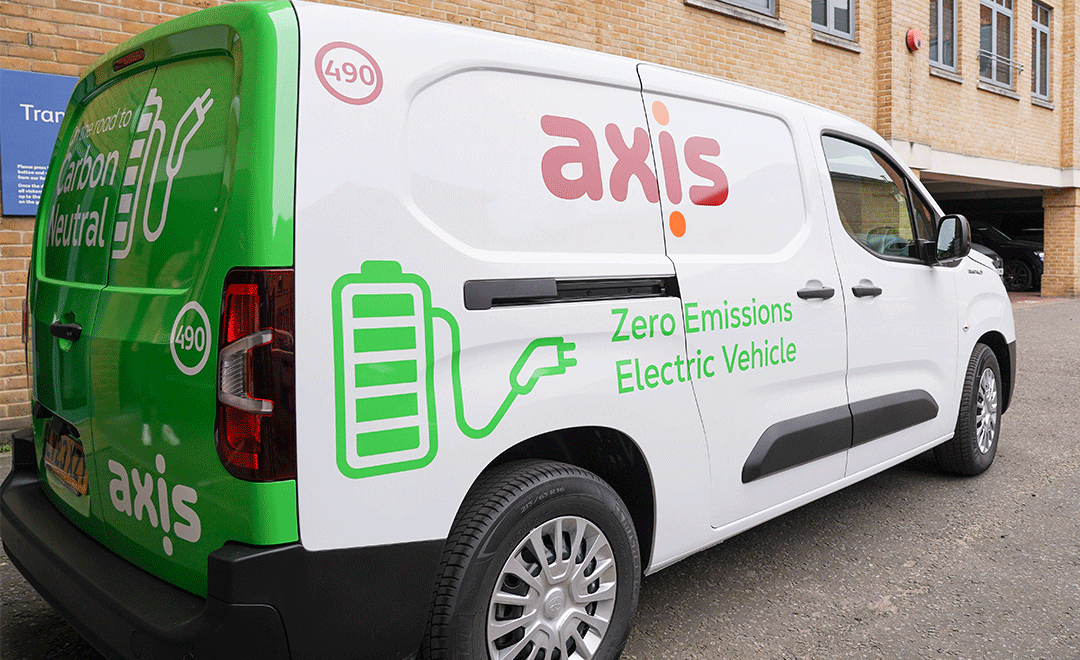20th June 2023
Electric Vehicles: Axis Charging Towards A New Fleet
For electric vehicles, the future is almost here. For Axis, our Fleet team will be ready for it.
Axis’ Core Value 7 is Protect our Environment, Protect our Future. And OV7 underpins our activity and our thinking here at Axis: on site, in our offices and on the road.
Our current fleet of 489 vans contributes 20% (1/5th) of our carbon emissions to our business total. Electric vehicles emit far fewer greenhouse gases and air pollutants than their petrol or diesel counterparts, improving air quality within the communities in which we work. In over a year, just one electric vehicle on the roads can save an average of 1.5 million grams of CO2. That’s the equivalent of four return flights from London to Barcelona.
And, since the government announced that new cars and vans powered wholly by petrol and diesel will not be sold in the UK from 2030, our Fleet Team have been hard at work looking at which electric van will be the best fit for Axis.
The team started by testing out the Toyota Proace City Electric. With a 75KW battery and an 11KW onboard charger, the van has an unladen range of up to 205 miles. It also demonstrated a smooth and quiet drive compared to our petrol or diesel motors. Of course, there are obvious environmental benefits to an electric fleet and a shift away from traditional fuel powers: the Toyota Proace produces no harmful C02 emissions = no gases at the tailpipe whilst driving.
So, in April 2023 we introduced the Toyota Proace City Electric to our fleet.
Taylor Burman, Fleet Manager at Axis, says: “It was an easy choice when going to market looking for a small electric van to use on our fleet. The Toyota Proace City EV is one of the mostly reliable and best small electric vans currently on the market. We are working hard at Axis to meet our deadlines and transition from ICE to EV.”
As well as fulfilling our own commitment to OV7, moving our fleet over to electric will also drive us closer to meeting our government obligations: to be Net Zero by 2050 and Carbon Neutral by 2030.
“To fulfil these government obligations we need to completely electrify our fleet by 2030. So, upgrading our fleet to these electric vehicles is a vital step forward in our journey” – Oliver Refson, Head of Sustainability and Quality
There are also big commercial benefits for the business. With a large portion of our contracts based in London; we contend with the Ultra Low Emission Zone daily. If our vehicles do not meet emissions standards, we face a charge of £12.50 every time we enter the zone. It’s a similar story for London’s congestion zone, where electric vehicles are exempt from the charge, which is £15 a day for driving within the Congestion Charge zone.
Benefits to Axis include:
Environment
- No C02 emission
- Supports Our Value 7
- Fulfils our legal/government obligations
Business
- London drivers exempt from congestion daily charge and the Ultra-Low Emission Zone (ULEZ) charge under the Cleaner Vehicle Discount. ULEZ is expanding from 29 August 2023 across all London boroughs. Current charge is £12.50 per day.
- Eligible for Government-funded Plug-in Van Grant (PiVG)
- Supports business tender applications which specify the use of zero emission vehicles
Practical matters
- Up to 205 miles range
- Fast charge in 32 minutes
- Can be charged using public charge points
- Smart Cargo system – no compromise on space
Our new van’s a winner!
- Winner What Car? and What Van? Van of the Year awards
- Winner Best Small Electric Van in the Driving Electric Awards 2023
One of the main barriers to complete electrification of the fleet is the infrastructure. According to Government figures (as of 1 July 2021), there were just 24,374 public electric vehicle charging devices available in the UK. This amount means having a fully electric fleet right now wouldn’t be commercially or logistically sustainable. Our operatives might struggle to find a charging point close by, or on the way to a job. If they have to take longer to find a charging point and wait hours to get a full charge, this would compromise Axis’ high standards and ultimately affect residents, who would be waiting longer for repairs.
Yet, the network of EV charging points (which Axis has experience in installing – see our EV projects here), is improving. The government plans to reach 300,000 public EV charge points by 2030 – equivalent to almost 5 times the number of fuel pumps on our roads today. That means charging will become easier, quicker, and cheaper than refuelling a petrol or diesel car. The Fleet team are aiming to switch 10% of their vehicles to electric by 2025, focusing on our London and Liverpool based contracts.
The wheels of this industry are changing quickly, but what’s certain is that Axis is already gearing up for it.





